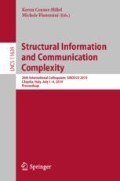Abstract
Self-stabilization [2] is a promising paradigm for designing distributed systems that are highly-tolerant of transient faults and adaptive to topology changes, since it guarantees that a system can recover its intended behavior even when its configuration (or global state) is arbitrarily changed by transient faults or topology changes. However, the recovery to the intended behavior requires a sufficiently long period of stable network environments (with no fault or topology changes). Self-stabilization guarantees nothing when the network has permanent faults or continuous topology changes. Thus, self-stabilization in the presence of permanent faults is a challenging and attractive issue.
Access this chapter
Tax calculation will be finalised at checkout
Purchases are for personal use only
References
Buhrman, H., Garay, J.A., Hoepman, J.H.: Optimal resiliency against mobile faults. In: Twenty-Fifth International Symposium on Fault-Tolerant Computing. Digest of Papers, pp. 83–88. IEEE (1995)
Dijkstra, E.W.: Self-stabilizing systems in spite of distributed control. Commun. ACM 17(11), 643–644 (1974)
Dubois, S., Masuzawa, T., Tixeuil, S.: Bounding the impact of unbounded attacks in stabilization. IEEE Trans. Parallel Distrib. Syst. 23(3), 460–466 (2012)
Nesterenko, M., Arora, A.: Tolerance to unbounded byzantine faults. In: Proceedings of the 21st IEEE Symposium on Reliable Distributed Systems, pp. 22–29. IEEE (2002)
Acknowledgment
This work was supported by JSPS KAKENHI Grant Numbers 17K19977, 18K18000, and 19K11826 and Japan Science and Technology Agency (JST) SICORP.
Author information
Authors and Affiliations
Corresponding author
Editor information
Editors and Affiliations
Rights and permissions
Copyright information
© 2019 Springer Nature Switzerland AG
About this paper
Cite this paper
Inoue, K., Sudo, Y., Kakugawa, H., Masuzawa, T. (2019). A Strongly-Stabilizing Protocol for Spanning Tree Construction Against a Mobile Byzantine Fault. In: Censor-Hillel, K., Flammini, M. (eds) Structural Information and Communication Complexity. SIROCCO 2019. Lecture Notes in Computer Science(), vol 11639. Springer, Cham. https://doi.org/10.1007/978-3-030-24922-9_28
Download citation
DOI: https://doi.org/10.1007/978-3-030-24922-9_28
Published:
Publisher Name: Springer, Cham
Print ISBN: 978-3-030-24921-2
Online ISBN: 978-3-030-24922-9
eBook Packages: Computer ScienceComputer Science (R0)

